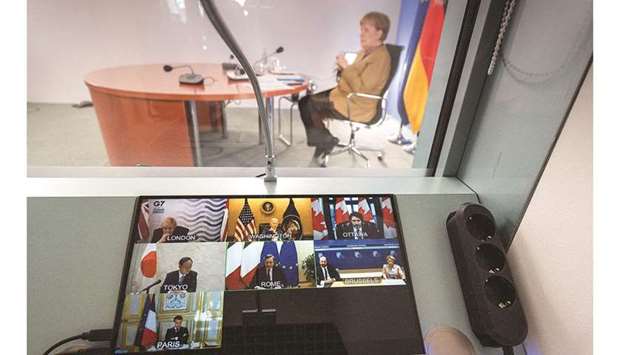The European Union has announced that it is doubling its contribution to the Covax global coronavirus (Covid-19) vaccination programme to €1bn ($1.2bn).
EU chief Ursula von der Leyen declared the increased funding from the bloc’s budget, and pledged a further €100mn in aid to support the fight against the virus in Africa, in a videolink appearance at a G7 summit.
The move comes as world powers look to ramp up support for poorer nations in the face of accusations that rich countries are hoarding vaccines against the coronavirus and leaving other parts of the globe behind.
US President Joe Biden was set to pledge $4bn in aid to Covax during the virtual meeting with other leaders from the Group of Seven major industrial nations.
Covax is a global project to procure and distribute coronavirus vaccines for at least the most vulnerable 20% in every country, allowing poorer states to catch up with the vaccination rush by dozens of wealthy countries.
French President Emmanuel Macron proposed that Western countries transfer 3-5% of their stock of Covid-19 vaccines to Africa, in an interview with the Financial Times published on Thursday.
The push to bolster vaccine programmes in developing nations comes despite a slow start to the inoculation rollout across the EU that has left the bloc lagging behind countries like the United States, Britain and Israel.
Separately, Germany is donating an additional €1.5bn ($1.8bn) to boost the rollout of vaccines in the world’s poorest countries, the finance minister said yesterday, increasing an earlier contribution of €600mn.
“Today we want to make clear: we stand with the poorest countries. Germany is providing a further €1.5bn for Covax, the World Health Organisation (WHO), and others,” Olaf Scholz said in a statement. “Vaccines are the only way out of the pandemic.”
Rich countries have come under fire for hoarding Covid-19 jabs at the expense of poorer countries, despite warnings from health experts that vaccines can only end the pandemic if they are distributed globally.
Scholz’s announcement came after EU chief von der Leyen’s.
German Chancellor Angela Merkel has said that vaccine sharing is “a question of fairness”.
But she also sought to reassure Germans that they are not being overlooked, following criticism of the sluggish start to the EU’s own vaccine drive.
“We also have an obligation towards our own citizens,” she told reporters after the G7 talks.
“There has to be a balance,” Merkel said, vowing that “not a single German vaccination appointment” would be affected by efforts to improve the global vaccine drive.
WHO chief Tedros Adhanom Ghebreyesus said he is “grateful” for the latest Covax pledges, but stressed that more donations are needed.
“Vaccine equity is not just right thing to do, it’s also the smart thing to do,” he said at the annual Munich Security Conference, held online because of the pandemic.
Yesterday Macron warned that Europe and the United States should without delay send enough Covid-19 vaccine doses to Africa to inoculate the continent’s healthcare workers or risk losing influence to Russia and China.
He said Africa needed 13mn doses to vaccinate all its health workers, a milestone that would help protect healthcare services.
“If we announce billions today to supply doses in six months, eight months, a year, our friends in Africa will, under justified pressure from their people, buy doses from the Chinese and the Russians,” Macron told the Munich Security Conference. “And the strength of the West will be a concept, and not a reality.”
Billionaire philanthropist Bill Gates meanwhile said yesterday that the politically-sensitive gap between vaccinating people in wealthy and developing countries could narrow to half a year.
As manufacturers increasingly join forces to boost production and governments step up donations to fund more equitable distribution of Covid-19 jabs, the “still quite dramatic” inequity in rollouts will decline, he told a virtual session at the Munich Security Conference.
“If we do this well, we’ll have about a six-to-eight-month delta of the vaccination levels of the rich countries to the developing countries, (which is) still longer than we’d like,” Gates said of the scramble for vaccinations in short supply. “We have a chance to get that gap to be only six months.”
Gates, who stepped down as chairman of Microsoft Corp in 2014, has through his philanthropic Bill and Melinda Gates Foundation committed at least $1.75bn to the global response to the coronavirus pandemic.
The WHO on Thursday urged nations producing Covid-19 vaccines not to distribute them unilaterally but to donate them to the global Covax scheme to ensure fairness.
Countries participating in the Covax coronavirus vaccine distribution mechanism will soon receive confirmation of their first shipments but should expect them to be small due to limited global supplies, the director of the Pan American Health Organisation said on Wednesday.
AstraZeneca’s vaccine makes up the lion’s share of doses in the Covax initiative, with more than 330mn doses due to roll out to poorer countries from the end of February.
Britain, for example, started vaccinations on December 8.
The Covax facility, which is co-led by the Gavi alliance, the WHO, the Coalition for Epidemic Preparedness Innovations, and the UN Children’s Fund, has said doses would cover an average of 3.3% of total populations of 145 participating countries.

German Chancellor Merkel is seen during a virtual summit with G7 leaders, on the coronavirus (Covid-19) pandemic, at the Chancellery in Berlin.
